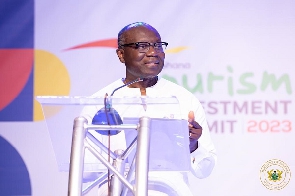 Finance Minister, Ken Ofori-Atta
Finance Minister, Ken Ofori-Atta
SEND Ghana, an advocacy organisation, has urged a reevaluation for certain aspects of the 2024 national budget, championing significant changes across various key sectors to ensure enhanced welfare and social protection.
Drawing from a comprehensive five-year assessment spanning 2020 to 2024, SEND highlighted urgent needs and policy gaps in areas like healthcare, education, agriculture and social protection.
“Through our rigorous analysis, we aim to provide valuable insights that can contribute to formulating policies addressing the evolving needs of the Ghanaian people over coming years,” SEND Ghana said in its analysis.
In the health sector, SEND Ghana called for the removal of budget caps on the National Health Insurance Levy (NHIL) to enable universal healthcare coverage.
“Funds accrued from the NHIL and SSNIT contributions have increased over the years, and shown great prospects of procuring health services for Ghanaians,” the analysis read in part.
“We urge government to release and ensure all NHIL collected is spent by the National Health Insurance Authority,” it continued.
Since 2020, both the NHIL and contributions from SSNIT have surged by 343 percent – soaring from GH¢2.582billion to GH¢8.852billion in 2024.
On average, government allocates approximately two-thirds of NHIL to the National Health Fund (NHF). However, in specific years such as 2021 and 2023, the planned allocations to the NHF were 63.1 percent and 47.4 percent respectively.
The group proposed that given the unpredictable nature of health emergencies, government should uphold its commitment to creating a Public Health Emergency Fund – designating the COVID-19 levy as a crucial funding source for this purpose.
This comes as the levy brought in GH¢889million in 2021, GH¢1.141billion in 2022 and GH¢2.533billion in 2023; and government aims to raise GH¢3.172billion in 2024, a substantial 357 percent year-on-year increase. The levy is anticipated to contribute approximately 1.8 percent of total government revenue in 2024.
Additionally, SEND Ghana recommended creating youth-friendly health centres nationwide.
“Data suggest more young persons are getting infected with HIV. Such youth-friendly centres would create a safe environment where young people can openly discuss concerns,” the statement noted.
In education, removing GETFund budget caps was advised to address infrastructure gaps. SEND critiqued that capping has hindered the fund’s ability to fulfil its mandate, with over 5,000 basic schools still under trees.
For social protection, SEND Ghana urged reassessing LEAP beneficiaries to determine continued eligibility and improve targetting of limited resources.
“This is long overdue, as after nearly 15 years of implementation government has not prioritised the reassessment exercise,” it continued.
The not-for-profit also called for raising social protection spending to two percent of Gross Domestic Product (GDP) so as to meet regional and global targets.
“Recent global crises and IMF austerity measures are estimated to further push more people into poverty. To forestall this, government must increase investment for social protection,” it stated.
In agriculture, SEND Ghana noted that budget allocations have fallen far short of the Comprehensive Africa Agriculture Development Programme’s (CAADP) 10 percent target.
“A financial boost is imperative to enhancing food and livelihood security, and reducing food importation,” it emphasised.
Furthermore, the analysis highlighted a need for increasing commitment to WASH and properly utilising sanitation levy funds. On WASH spending declines, SEND Ghana called on government to increase allocations to achieve Sustainable Development Goal 6 (SDG 6), which aims to ensure availability and sustainable management of water and sanitation for all by 2030.
SDG 6.1 focuses specifically on drinking water and states: “By 2030, achieve universal and equitable access to safe and affordable drinking water for all”.
Globally, as of 2020, 2.2 billion people lacked safely-managed drinking water services.
In the country, there remains an urban-rural disparity; while access to safe drinking water has improved significantly, there remains a gap between urban and rural areas. In rural areas, only 74 percent of the population has access compared to 92 percent in urban areas.